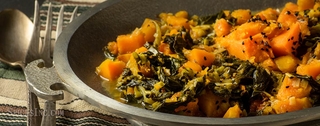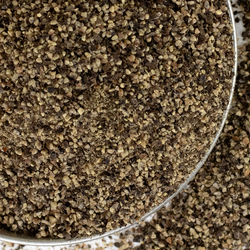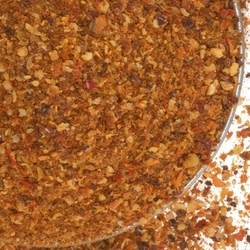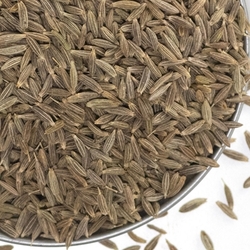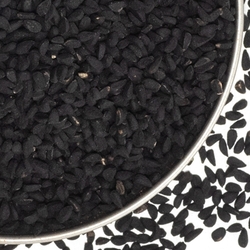Braised Ethiopian Collard Greens
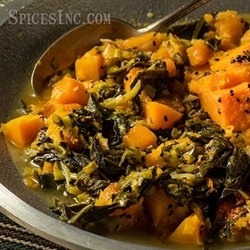
Gomen, or braised Ethiopian collard greens, are a standard side dish in Ethiopian cuisine. These greens are richly seasoned and sitting in a tart, spicy sauce. The dish is traditionally topped with Nigella Sativa, small black seeds that are native to western Asia and eastern Europe, but have been a part of northern and western Africa’s cultures for at least 3,000 years. Nutty, oniony, and a little bit peppery, Nigella Sativa seeds add a great luxe crunch to the soft and aromatic greens.
Collard greens have a reputation for being tough, needing hours of slow cooking to break down their hearty leaves. Folks, 30 minutes over heat is more than long enough to turn these leaves soft and chewy, with a hint of crispness. We braised them with beautiful, buttery leeks. Leeks tend to break down and almost dissolve with a longer cooking time, infusing the entire dish with gentle onion. Leeks and collards tend to trap dirt in their layers as they grow and require a touch more attention to clean them thoroughly. Collards are unheaded cabbage, meaning they grow into stalks rather than spheres, but the stalks are tightly clustered together and grab soil as they grow. Leeks, members of the onion family, have layers. They thrive in sandy soil, and as the leeks put on new sheaths they trap sand. Wash each collard leaf, front and back, in cool running water. Remove the tough green tops and hairy roots from leeks, cut them in half horizontally, and put them cut-side down in a large bowl filled with cold water. Swish them around a little and then let water and gravity do their work; it should pull the dirt out of the leeks in a matter of minutes. When you take them out of the bowl, run them under cool water with their layers spread to make sure all the silt is gone. Then you can chop and process as you like.
This dish is commonly served over injera, a spongy flatbread made with fermented teff flour. Injera is used both as a plate and as a way to soak up all the juicy bits of the food on top of it. If you don’t have injera, serve this over rice or couscous, or with a lovely piece of thick, crusty bread that you can use to sop up the cooking liquid when you’re finished. Try is alongside a plate of Doro Wat with some Awaze Sauce for the bold. Enjoy!
- 1 medium-sized (2-3 pound) butternut squash
- 1 Tablespoon honey
- 2 Tablespoons melted butter, divided
- 2 Tablespoons Nigella Seeds, divided
- 2 teaspoons Fine Sea Salt, divided
- 1 teaspoon Black Pepper Medium Grind
- 2 pounds collard greens, stemmed and roughly chopped
- 3 diced leeks, white portion only
- 1 Tablespoon canola oil
- 1 Tablespoon Cumin Seeds
- 1 Tablespoon finely diced ginger root
- 1 Tablespoon finely diced garlic clove
- 1½ teaspoons Honey Habanero Rub
- 1 Tablespoon white wine vinegar
- ½ cup water
1. Preheat oven to 375°F.
2. Peel squash, cut in half lengthwise, and scoop out the seeds. Mix honey with 1 Tablespoon of melted butter and brush the cut side of the squash. Season the squash with 1 Tablespoon Nigella Seeds, 1 teaspoon Fine Sea Salt, and 1 teaspoon Black Pepper Medium Grind.
3. Roast the Butternut Squash at 375 degrees for 45 minutes or until soft. Remove from oven and set aside.
4. Thoroughly wash the collard greens by removing stems and running leaves under water. Roughly chop. Set aside.
5. Remove tough green tops from leeks, then cut in half lengthwise and wash thoroughly. Slice into 1/4 inch thick half-moons. Set aside.
6. On the stovetop, warm canola oil and the remaining Tablespoon of butter in a Dutch oven, over medium heat.
7. Briefly toast the Nigella and Cumin seeds in the butter and oil combination until fragrant.
8 Add leeks, garlic, and ginger to the Dutch oven and sauté until translucent but not brown.
9 Add collard greens, Honey Habanero Rub, and remaining Fine Sea Salt, then cook for 5 minutes.
10 Pour in water and white wine vinegar, bring to a boil, cover, and then reduce heat to low. Cook for 30 minutes or until the collards have softened.
11 Roughly chop the cooked butternut squash and stir into the collard greens.

